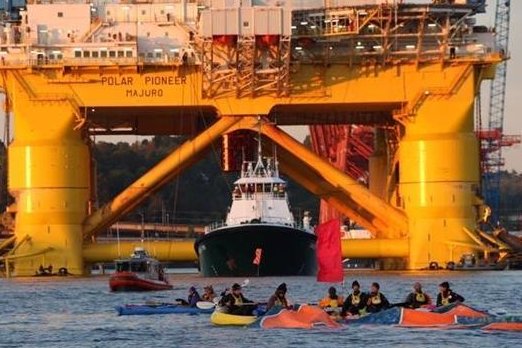Greenpeace activists arrested by U.S. Coast Guard officials during protest against Shell drilling plans offshore Alaska. Photo courtesy of Greenpeace.
JUNEAU, Alaska, July 23 (UPI) -- Legal counsel for advocacy group Oceana said that, while pressure hasn't stopped Shell's slow march to arctic oil, feet can be still held to the fire.
The Bureau of Safety and Environmental Enforcement granted permission to Shell to drill two wells in the arctic waters off the Alaskan coast. BSEE said the permits excluded drilling into oil-bearing zones because Shell lacks a critical piece of safety equipment.
Shell's efforts to drill offshore Alaska have long been the target of advocacy groups, most recently from kayak-bound activists protesting against rig deployments from the Port of Seattle.
Michael LeVine, Pacific senior counsel for Oceana, said that, given Shell's track record in Alaskan waters, a return to the regulatory and procedural drawing board may be long overdue.
"The best way forward is to wipe the slate clean and start over," he said in response to email questions. "We should not be beholden to poor decisions by the government to sell leases or poorly planned investments by companies to spend lavishly on them."
Shell in early July said a small breach was discovered in the hull of MV Fennica, chartered to carry a capping stack to drilling sites in the Chukchi Sea.
Shell is proposing as many as six wells in a region known as the Burger prospect, located in shallow waters off the coast of Alaska, using the Noble Discoverer and Polar Pioneer rigs. Shell would need the capping stack positioned near drilling sites to continue beyond the exploratory phase.
"Without the required well control system in place, Shell will not be allowed to drill into oil-bearing zones," BSEE Director Brian Salerno said. "As Shell conducts exploratory activities, we will be monitoring their work around the clock to ensure the utmost safety and environmental stewardship."
The Noble Discoverer rig suffered setbacks during a 2012 campaign off the coast of Alaska. Some advocacy groups said that, and the more recent equipment issues, is evidence that Shell is not prepared to handle an oil spill in the region of any degree of magnitude.
"Shell shouldn't be drilling in the arctic, and neither should anybody else," Franz Matzner, director of a post-oil campaign for the National Resource Defense Council, said in a statement.
LeVine noted that a series of court actions against Shell are in part responsible for the current limited permit for Shell. The company, and the government itself, are not necessarily displaying the stewardship expected from some members of the advocacy community.
"Better science and planning should lead to better decisions about whether these activities can happen safely and responsibly," he said.















